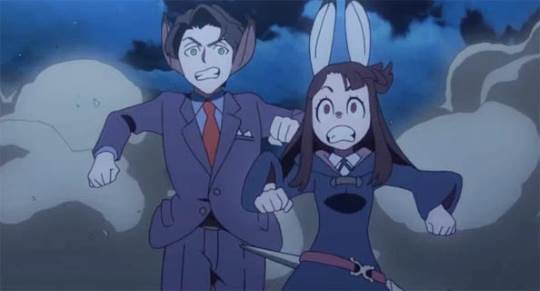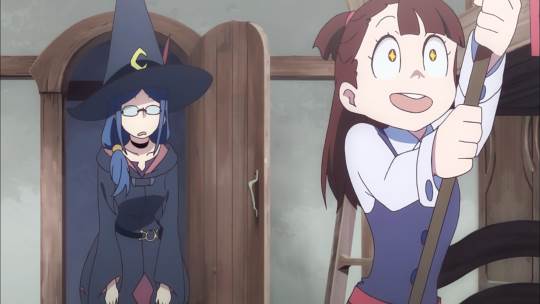Silver Screenings: Little Witch Academia

I don’t know if Little Witch Academia is the best anime Trigger has ever made, but it is certainly their most tightly woven narrative that I’ve seen (with Kiznaiver and the rest of Darling in the Franxx on my queue). As I will dive into next time in this column, Kill la Kill’s greatest struggle was its own lack of restraint. It delighted in its over-the-top style. Like the scorpion stinging the toad, its own nature doomed itself to become comparatively cluttered and at times confusing.
Little Witch Academia still concludes with an outrageous set-piece when compared to more contemporary – especially for American audiences – entertainment, but the concluding adversary is a clear manifestation of an antithesis. It is an amalgamation of the ideas that run counter to protagonist Atsuko “Akko” Katsuragi.
While at the magical Luna Nova Academy, Akko learns a variety of lessons regarding hard work, hero worship, forward progress, and believing in oneself. It is in these lessons that the major themes of the show are tackled and often interlinked.
Unlike many of the other witches attending Luna Nova, Akko is inexperienced and seems to have no knack for magic. She cannot fly a broom and struggles with even the most basic seeming spells. She is impulsive, emotional, and lacking in restraint. Diana, juxtaposed as her rival, is of noble blood, polite, and excels in magic. On the surface, these two are complete contradictions of one another.
As the show progresses we instead see that they are separate manifestations of the same seed of ideas and inspiration. Diana is not instinctively good at magic. She herself has had to invest a lot of time and effort to cast spells as efficiently as she does. She is our first lesson that no one is great – or even good – without first having to put in the effort to get there.
We also discover that Akko’s idol Shiny Chariot, the theatrical witch that inspired Akko as a child, similarly stumbled as a youth. What seemed so natural on the stage took a lot of failure and work to achieve.
While Akko never manages to cast magic as effectively as the other characters, we see her gradually improve as the show progresses. She never completely overcomes her impulsive nature, but she bounds over many external and internal roadblocks to become a much greater witch by the conclusion. Hard work may reward slowly, but it is still rewarding.
This blends over into the subject of hero worship. Yes, we learned that Shiny Chariot had to overcome her own weaknesses, but we also learn that she is fallible. The Shiny Chariot in Akko’s head never existed. In fact, such a Chariot was an impossibility. Instead, Akko forms a much more meaningful relationship with the clumsy Professor Ursula. To this end I feel that the show wants to remind us that our heroes are not Gods, warning us not to put them up on a pedestal. It is fine to be inspired by such people, but the relationship that matters is with the mentor that cares for and supports you – even if that support includes reprimands and lectures.
Having to work hard to succeed and learning of her hero’s fallibility leads Akko to another accomplishment: belief in her own strengths and talents. Chariot’s “believe in your magic” at first seems similar to simply believing in oneself. It actually specifies an understanding of what sets you apart from others. As I said earlier, Akko is never as talented at magic as any of the other characters in the show. She still accomplishes much due to her optimistic idealism and outside perspective. She finds success in her own methods and even helps some of her friends find their own.

This is perhaps one of the most dangerous lessons that can be learned from Little Witch Academia. After all, Akko is a flawed character. Her behavior often gets others into trouble, and rarely are the consequences as severe as the alternate-chronology Enchanted Parade film. Any negative impact her behavior makes is easily forgotten in contrast with the positivity she yields.
Viewers can still be confused into believing they can “accomplish anything” that they “set their mind to”. My generation is still suffering the after-effects of this great societal lie. The truth is that not everyone can be great – or at least, not everyone can be great in the same way. Believing in your magic may simply mean excelling at a smaller, more personal skill that makes ripples rather than waves.
It is this perspective and series of lessons that I think makes Little Witch Academia a worthwhile watch for all ages. Before I wrap this up, let’s dig into one last angle of the narrative.
There’s a frequent dichotomy of old or tradition versus the new or different. At the show’s start, rigid adherence to the way things have always been is represented as a negative thing. The school is struggling financially and in societal relevance. Akko, being an outsider, is not only unfamiliar with tradition, she fails to comprehend much of it. Most of the old ways fly in the face of the wonder and delight she believes magic can bring. This often puts her at odds not just with the faculty, but other students like Diana.
As the show progresses, we also see that new technology has its own risks. This, however, may be where the show portrays its themes in the most weak manner, as it is also interwoven with another vague theme I haven’t mentioned yet: the power of positivity over negativity.

It’s easier to understand the show’s trajectory if we first consider its conclusion: that forward progress is built upon a new execution of old foundational principles. In other words, in order to grow you must change, but change does not necessarily mean to be replaced.
I unfortunately cannot go into as deep of a dive as I’d like without detailing the latter half of the show’s dramatic events and reveals. I would love for this essay to not only encourage more people to watch Little Witch Academia, but to also watch it with their children.
What I will say is that the many themes create a sort of cycle. While Akko represents many of these themes in her growth as a protagonist, many of the characters – particularly Professor Ursula and Diana – also represent them in their own right.
Heroes will inspire a new generation to dream. That new generation will need to work hard to achieve those dreams. Through this hard work they will gain a better understanding of themselves, and – inspired by the foundational principles of their heroes – push forward to carry those ideas into a new future.
Many of the conflicts in both the foreground and background of Little Witch Academia are based on choosing one path or another. Old grudges put fire to the kindling coals of a seemingly minor upset. Old tradition struggles to stomp out new, outside-the-box ideas. Modern sensibilities seek to abolish the old as obsolete. Poised at the center is Akko.
There are a variety of reasons I love this show. Much of it is simply how lovable and diverse the different characters are. Those personalities elevate both the slapstick and situation comedy. Each character is made more real and relatable through each dramatic turn, especially towards the show’s conclusion.
These obvious and superficial strengths are only so strong because of the themes carrying them. Themes that appeal to me as someone that has suffered participation trophies creating a false, fragile self-esteem. Someone that learned too late the real value of hard work. Pushing principles forward into a new era rather than traditions.
I can understand then if others do not see the same appeal as I do. Nevertheless, I think this is a show everyone should at least give a chance. No matter how you relate with them, the thematic concepts are universal enough that anyone should be able to find something enjoyable within the show.


